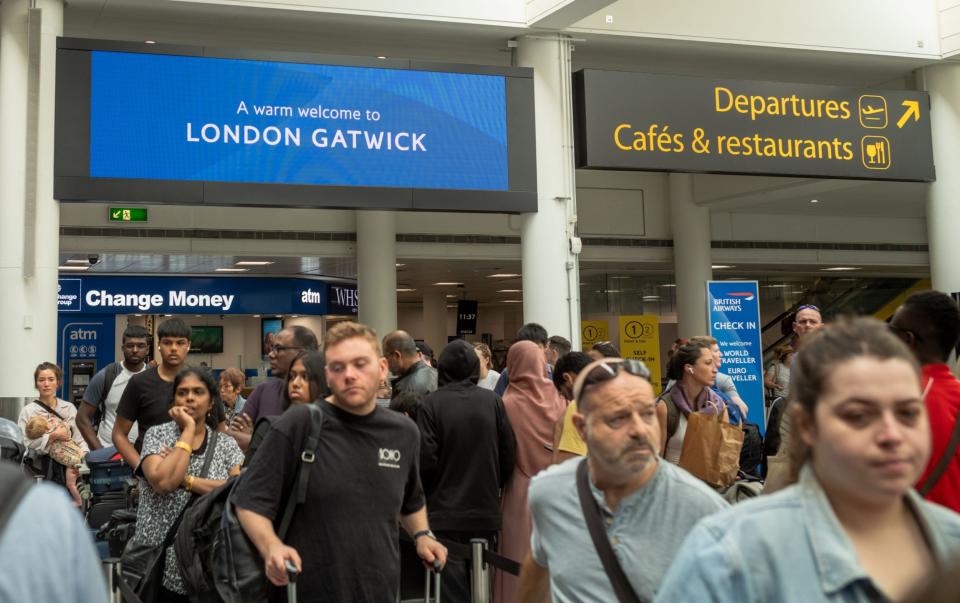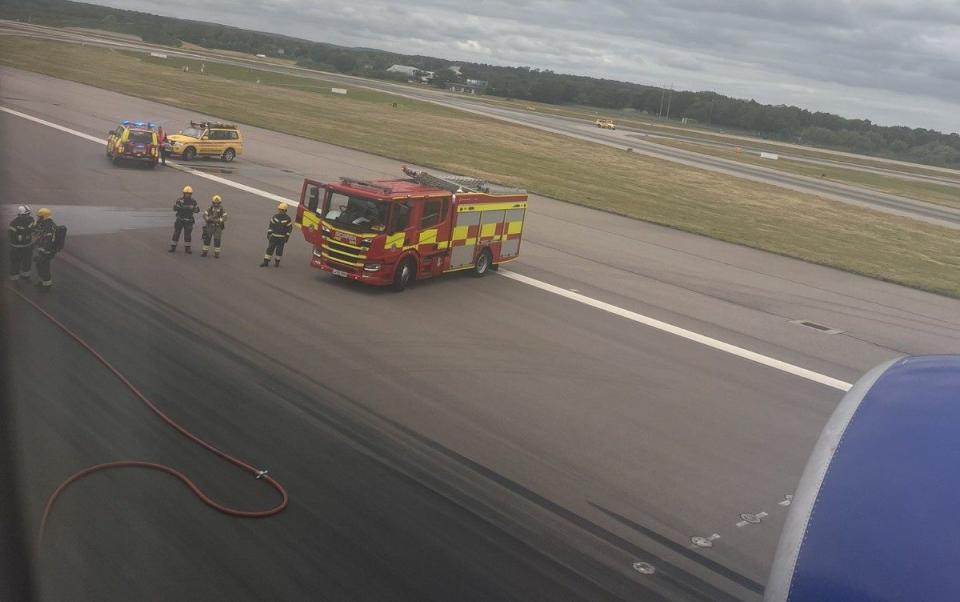Families are facing travel chaos as thousands of airline passengers were diverted from Gatwick Airport after a plane sat on the runway for more than half an hour on Friday.
The British Airways flight, a scheduled service to Vancouver, was left stranded after the pilots on board performed an emergency drill to stop the airliner during take-off due to a technical problem.
The plane, a Boeing 777-200ER, was then stuck on the airport runway for another 38 minutes after the “rejected takeoff”, according to flight tracking website Flightradar24.
News of the reshuffles broke with a major union threatening further disruption in July during the prime summer holiday period.
Around 300 security and passenger assistance staff are going on strike over two three-day periods in July – including the crucial weekend of July 19 to 21, which is the first weekend after most of schools in the country for the summer, said Unite.

Disruption is also expected this summer as a result of the threat of delays and cancellations amid a shortage of air traffic control (ATC) staff.
Ryanair has already canceled dozens of flights after a shortage of controllers at a major ATC hub in the Netherlands left planes out of position and unable to take off this morning.
Meanwhile, police arrested 27 Just Stop Oil protesters on Friday on suspicion of planning to cause widespread disruption at airports during the summer holidays.
Scotland Yard said arrests had taken place across the country and a number of “key organisers” had been detained.
The force said coordinated raids took place in 10 counties, including London, Oxford, Surrey, Norfolk, Manchester and West Yorkshire.
JSO had previously hinted that it planned to disrupt the summer holidays in a “sustained period of activity”, and warned against an attack on Stansted Airport last week, where two private jets were sprayed with orange paint , but “introduction”.
The suspects were all arrested under a section of the Public Order Act which makes it illegal to conspire to disrupt national infrastructure.
The arrests began on Tuesday, when four people were arrested after “being identified at Gatwick Airport”.
They have since been released on bail.
Due to disruption at the airport on Friday, passengers on 17 flights were diverted to other airports as far away as Brussels.
Six easyJet flights were diverted to Luton and Stansted, while the pilots of the Emirates A380 super jumbo from Dubai chose to land in the Belgian capital.
Other airlines, including Ryanair and Vueling, launched some flights to Luton and Stansted, while the Norwegian flight ended at Bournemouth airport on the south coast.
Data from Flightradar24 indicated that around 40 Gatwick flights were delayed following the incident.
A British Airways spokesman said: “Our pilots took the precautionary decision to cancel take-off due to a technical issue. Safety is always our top priority and we apologize to customers for the inconvenience caused.”
Gatwick passengers said on social media that the airport’s fire service was called to press down and cool the Boeing’s brakes after a rejected take-off, an emergency measure that can heat brakes to hundreds of degrees.
Airliner tires are protected by “fuse plugs” that melt if they get too hot, allowing the high-pressure air inside to escape safely in a controlled manner to prevent a dangerous explosion.


A Gatwick airport spokesman said: “The main runway was closed for a short time today due to a hot brake on a departing aircraft.
“Safety is our top priority and the airport’s dedicated fire service attended quickly to support the aircraft.
“Several flights have been diverted. The runway is now open and operating as normal.”
A spokesman added that the airport hoped to reach a “resolution” before the proposed strikes took place.
“We are working with our suppliers to avoid any impact and expect to operate a normal summer holiday flight schedule for our airlines and passengers on these dates,” she said.
Meg Reed, director of passenger assistance firm Wilson James, accused Unite members of rejecting a pay deal that would have seen wages rise by almost a fifth above the National Living Wage.
“The company has put forward three above-inflation pay offers to our staff, the latest of which would ensure an 8 per cent pay rise by October, which Unite members have refused to vote against in their workplace ballot,” she said. .
An ICTS spokesman said its 100 security screening personnel who voted to strike also rejected an 8 percent pay rise offer.
The airport has contingency plans in place to minimize disruption, both companies said.